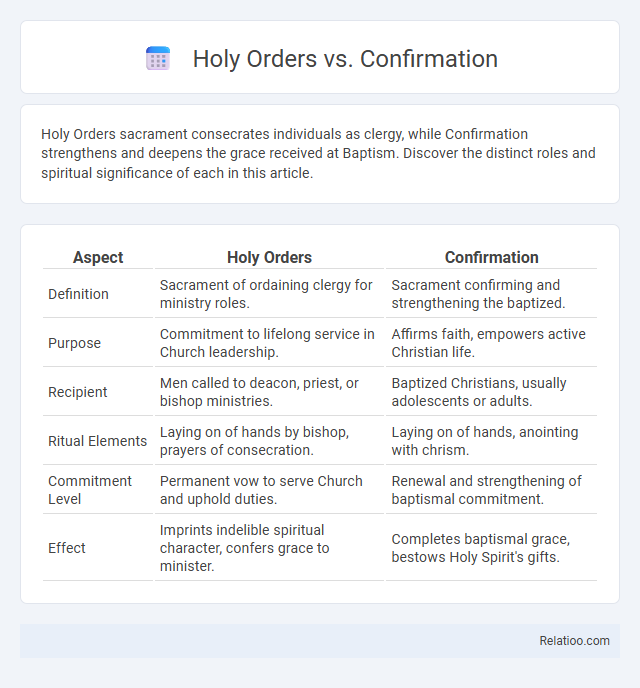Holy Orders sacrament consecrates individuals as clergy, while Confirmation strengthens and deepens the grace received at Baptism. Discover the distinct roles and spiritual significance of each in this article.
Table of Comparison
| Aspect | Holy Orders | Confirmation |
|---|---|---|
| Definition | Sacrament of ordaining clergy for ministry roles. | Sacrament confirming and strengthening the baptized. |
| Purpose | Commitment to lifelong service in Church leadership. | Affirms faith, empowers active Christian life. |
| Recipient | Men called to deacon, priest, or bishop ministries. | Baptized Christians, usually adolescents or adults. |
| Ritual Elements | Laying on of hands by bishop, prayers of consecration. | Laying on of hands, anointing with chrism. |
| Commitment Level | Permanent vow to serve Church and uphold duties. | Renewal and strengthening of baptismal commitment. |
| Effect | Imprints indelible spiritual character, confers grace to minister. | Completes baptismal grace, bestows Holy Spirit's gifts. |
Introduction to Holy Orders and Confirmation
Holy Orders and Confirmation are both essential sacraments in the Catholic Church, serving distinct roles in spiritual development and ecclesiastical function. Holy Orders ordain men to the clergy, empowering priests, deacons, and bishops to perform sacred rites and lead the Church community. Confirmation strengthens baptized individuals with the Holy Spirit, deepening their faith and commitment to live as mature Christians within the Church.
Defining Holy Orders: Purpose and Significance
Holy Orders is a sacrament in the Catholic Church that confers the grace and spiritual authority necessary for clergy to perform sacred duties such as preaching, administering the Eucharist, and pastoral governance. Its purpose is to consecrate individuals as deacons, priests, or bishops, enabling them to serve the Church and the faithful in a ministerial capacity. This sacrament signifies a special commitment to God and the Church, distinct from Confirmation, which strengthens the baptized with the Holy Spirit for Christian living and witness.
Understanding Confirmation: Meaning and Importance
Confirmation is a vital sacrament in Christian theology that signifies the strengthening of faith and the deepening of one's commitment to the Church. It serves as a spiritual empowerment through the Holy Spirit, completing the grace received at Baptism and enabling individuals to actively participate in the Church's mission. Unlike Holy Orders, which ordain clergy for specific ministries, Confirmation is conferred on baptized believers to affirm their initiation into the faith community.
Scriptural Foundations of Holy Orders and Confirmation
Scriptural foundations of Holy Orders originate from passages like Luke 22:19-20, where Jesus institutes the priesthood through the Last Supper, and Acts 6:6, depicting the apostles laying hands on chosen deacons. Confirmation's biblical basis is found in Acts 8:14-17, where the apostles lay hands on believers to receive the Holy Spirit, strengthening their faith. Your understanding of these sacraments deepens by recognizing Holy Orders as the authorized ministry and Confirmation as the empowerment for Christian witness.
Sacramental Differences: Holy Orders vs Confirmation
Holy Orders and Confirmation are distinct sacraments within the Catholic Church, each conferring different spiritual graces and responsibilities. Holy Orders imparts a sacred authority to perform ecclesiastical duties, including priesthood, diaconate, and episcopacy, enabling the ordained to administer other sacraments and lead the Christian community. Confirmation strengthens the baptized believer's bond with the Church through the Holy Spirit, enhancing their spiritual maturity and commissioning them to witness Christ in everyday life.
Roles and Responsibilities: Clergy vs Confirmed Laity
Holy Orders confers specific roles and responsibilities on the clergy, including administering sacraments, leading worship, and guiding the spiritual community, while Confirmation empowers the laity by strengthening their faith and calling them to active participation in the Church's mission. Your role as a confirmed layperson involves witnessing Christ in daily life and supporting the Church's ministries without the sacramental authority reserved for ordained ministers. Understanding these distinct functions clarifies the collaboration between ordained leaders and the confirmed faithful in nurturing the spiritual and communal life of the Church.
Rite of Holy Orders: Steps and Traditions
The Rite of Holy Orders involves three distinct steps: the ordination of deacons, priests, and bishops, each signifying a deeper commitment to Church ministry. Traditions include the laying on of hands by a bishop and the anointing with chrism oil, symbolizing the Holy Spirit's empowerment for sacred duties. Understanding these stages helps Your appreciation of Holy Orders as a sacrament that confers spiritual authority and responsibility within the Church hierarchy.
Rite of Confirmation: Process and Practices
The Rite of Confirmation emphasizes the deepening of baptismal grace through anointing with chrism oil and the laying on of hands by a bishop, symbolizing the recipient's full initiation into the Catholic Church. This sacrament typically includes renewal of baptismal promises and prayers for the Holy Spirit, signifying spiritual strengthening and the commitment to Christian witness. Confirmation differs from Holy Orders, which ordains clergy, and Baptism, the initial sacrament of initiation, by focusing on spiritual maturity and empowerment for active participation in church life.
Spiritual Effects and Graces of Each Sacrament
Holy Orders imparts the grace of apostolic ministry, conferring spiritual authority and the ability to administer sacraments, strengthening the recipient for service in the Church. Confirmation bestows the gifts of the Holy Spirit--wisdom, understanding, counsel, fortitude, knowledge, piety, and fear of the Lord--fortifying the individual to live a mature Christian life and witness to faith. The Sacrament in general sanctifies the soul, imparts sanctifying grace, and fosters spiritual growth, each specific sacrament conferring unique graces aligned with its divine purpose.
Holy Orders and Confirmation in the Life of the Church
Holy Orders and Confirmation are vital sacraments in the life of the Church, each serving distinct roles in spiritual growth and ministry. Holy Orders confers a sacred authority upon clergy, empowering bishops, priests, and deacons to lead worship, administer sacraments, and shepherd the community. Confirmation strengthens Your baptismal grace, deepening the Holy Spirit's presence to fortify faith, commitment, and active participation in the Church's mission.

Infographic: Holy Orders vs Confirmation
 relatioo.com
relatioo.com